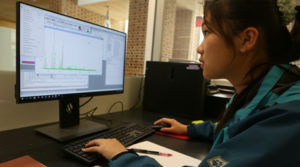
William & Mary Approved to Offer Bachelor’s Degree in Data Science
March 18, 2020 — The State Council of Higher Education for Virginia has approved William & Mary’s proposal for a new bachelor of science degree in data science.
A March 9 SCHEV letter to university Provost Peggy Agouris states that the new B.S. in data science degree is approved to begin in the fall 2020 semester.

Data science grows: Only a few years old, data science is popular as a self-designed major and a minor. A recent decision by SCHEV to approve a formal bachelor of science in data science degree is expected to advance the program further. Image courtesy of Stephen Salpukas, William & Mary.
“After much hard work in terms of programming and preparation, William & Mary is excited to offer the bachelor of science in data science to our students,” Agouris said. “We are encouraged that SCHEV recognizes William & Mary as the appropriate space to offer this new degree, which promises to increase the commonwealth’s workforce capabilities.”
Data science is already a popular option for undergraduates. William & Mary started its data science program in 2017 as a minor and a self-designed major.
Matthias Leu, director of the program, said around 45 students are majoring in data science at present, with another 40-some declaring a data science minor. William & Mary graduated its first cohort of 15 data science majors in 2019.
“This will change the whole program,” Leu said. “Students who want to pursue a degree in data science will now receive an actual degree in data science — it will say ‘B.S. in data science’ on their diplomas. Up until now, students received an interdisciplinary degree.”
He stressed that changes brought about by the new degree program will go far beyond what is printed on diplomas.
“Because it is a B.S. now, there are more math courses that students will take as compared to the interdisciplinary degree,” Leu said.
Data science is an interdisciplinary program at William & Mary, drawing on faculty from disciplines ranging from computer science and English. Coursework embraces computer programming, modeling and also philosophy coursework, to give students a basis in considering the moral implications of working with algorithms and big data.
The data science steering committee represents the interdisciplinary nature of the program. The committee members are Jaime Settle, associate professor of government; Elizabeth Losh, associate professor of English, American studies, and gender, sexuality and women’s studies; Michael Lewis, chair of computer science; Dan Runfola, assistant professor of applied science; Dan Parker, assistant professor of English; Josh Burk, chair of psychological sciences; Gregory Hunt, assistant professor of mathematics; and Leah Shaw, associate professor of mathematics.
Leu praised the group’s creativity and patience and particularly credited the work of Susan Bosworth, associate provost for institutional accreditation & effectiveness.
“She was instrumental in seeing this through all the revisions,” he said. He also noted the contributions of Janice Zeman, dean of undergraduate studies, who, along with Runfola, read through and commented on numerous drafts of the SCHEV proposal.
Leu points out that the data science degree is the product of strategic planning and consultation. The goal was always to develop a program engineered to prepare graduates for the challenges of big data in the 21st century.
“We consulted with industry,” he said. “We talked with a lot of folks and they all said this program needed a good base of math and computer science — but also public speaking, ethics. These are the attributes they said were important in the people they want to hire.”
The self-designed data science major and minor has had interdisciplinary attraction as well, pulling in students from the humanities, the social sciences, natural sciences, “even physics and mathematics,” Leu said. “Some students, of course, are interested in computer science. It’s really across the board.”
So far, the graduates in the self-designed major have done well, landing good internships and spots in Ph.D. programs, Leu said. William & Mary will continue to expand its data science offerings, including plans for a “jump-start” summer program that begins with an online class.
“This is a marvelous example of the ways in which students and faculty inspire one another at W&M,” Agouris added. “As faculty were working to design the B.S., students came forth with a proposal that dovetailed beautifully with their plans and actually helped shape the program.”
Source: Joseph McClain, William & Mary






























